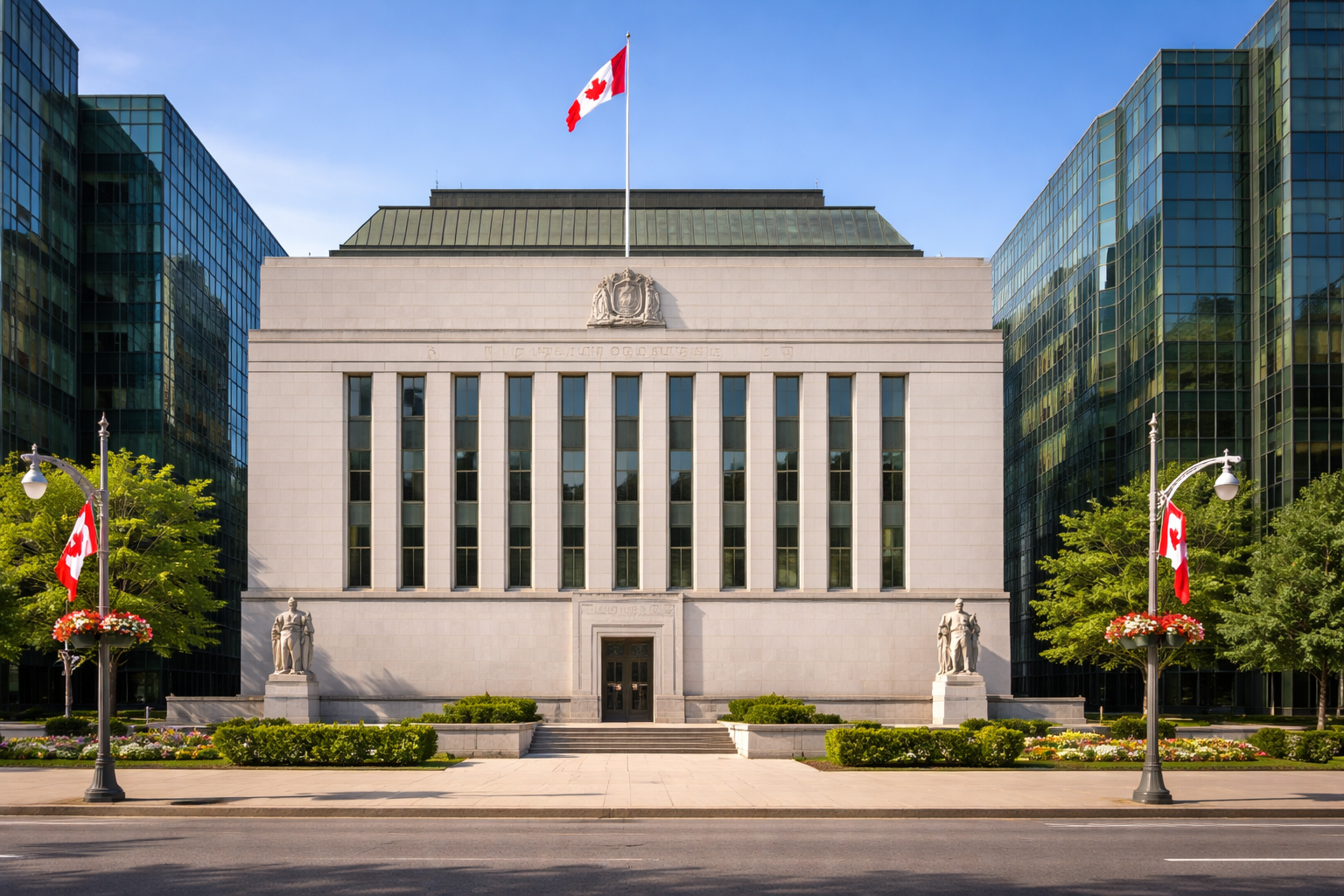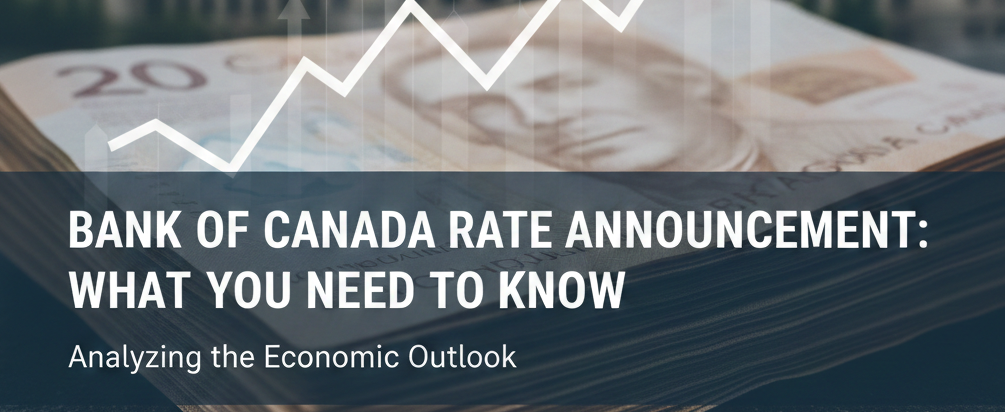Darryl Kraemer
Contact Info:
About

Explore Our Services
Preview Our Rates
Access all your mortgage options with just one application. Preview today's rates first:
Our Lenders

Blog

Bank of Canada Rate Hold
January 28, 2026
The Bank of Canada decided to hold interest rates today, which means there was no change to the overnight rate. It remains at 2.25%. This is good news for many homeowners and buyers. Holding rates brings stability, and that’s helpful when planning your finances.
The Bank shared that inflation is staying close to its 2% target, which is a good sign. While there are still some global uncertainties, Canada’s economy is showing steady progress, and the Bank feels today’s rate level is appropriate for now.
Bank of Canada Governor Tiff Macklem said the economy is showing resilience despite some challenges. Because of that, the Bank wants more time and information before making its next move.
If you have a fixed-rate mortgage, nothing changes. If you have a variable-rate mortgage, your rate stays the same. If you’re thinking about buying, renewing, or refinancing, this pause gives us time to plan carefully and make smart choices. Some experts believe the Bank could begin cutting rates later this year if the economy needs more support. Others think the Bank is being cautious, and that caution helps avoid sudden changes that can catch homeowners off guard.
Right now, the best move is to stay informed and have a plan. Everyone’s situation is different, and small timing decisions can make a big difference. If you’re coming up for renewal, considering a move, or just want to understand how this affects your mortgage, I’m always happy to talk it through with you.
The next Bank of Canada rate announcement is scheduled for March 18, 2026, and I’ll continue to keep you updated.

What 2026 Could Bring For Your Mortgage
January 20, 2026
As we head into 2026, I’ve been getting a lot of questions about what’s coming next for homeowners and buyers.
So, I wanted to share a quick note with you, no jargon, no pressure, just a helpful look at what market experts are saying and what it could mean for you.
The housing market in 2026: steady, not wild
The word most often used to describe 2026 is “balance.” Home prices are expected to rise slowly in many areas, not jump as quickly as in the past. Some markets will be busier than others, but overall, things should feel calmer and more predictable.
For buyers, this can mean less pressure to rush and more time to make good decisions. For homeowners, it means values are holding up, and long-term stability is still there.
One of the biggest things happening in 2026 is mortgage renewals. Many Canadians will be renewing mortgages that were set up years ago, when interest rates were much lower. That means some people may see higher payments when their term ends.
The good news? You have options, and planning ahead can make a big difference.
Even if your renewal is still months away, it’s smart to:
- Review your mortgage now
- Look at different lenders (not just your current one)
- Talk through strategies that fit your budget
What about interest rates?
Rates are always top of mind, and in 2026, most experts expect them to be fairly steady, not jumping up or down dramatically. That means fixed rates may remain higher than they were years ago, and variable rates will still be a good fit for some borrowers. There’s no one-size-fits-all answer. What matters most is choosing a plan that fits your comfort level and goals.
Here are a few easy things you can do this year:
- Know when your mortgage renews
- Ask questions early, even if you’re “just thinking”
- Review your budget and future plans
- Reach out if you want a second opinion
In a more balanced market, working with a mortgage broker and having the right advice matters even more. I will help you compare options across multiple lenders, understand the numbers in plain language, and explore solutions beyond a standard mortgage when needed.
Remember, I work for you. My goal is to help you feel confident and prepared, not rushed or confused. 2026 doesn’t look scary; it just looks different. With the right plan and the right support, there are great opportunities ahead.
If you ever want to talk through your situation or explore options that might work for you, I’m always happy to help.

Self‑Employed in Ontario? January Is the Month That Sets Your Mortgage Up for the Whole Year
January 14, 2026
For self‑employed homeowners and buyers, January isn’t just a fresh start—it’s a strategic window. Decisions you make right now around income, structure, and timing can dramatically affect what you qualify for (and how comfortably) later in 2026.
Why January matters more for the self‑employed
Unlike salaried borrowers, self‑employed clients don’t get a clean snapshot. Lenders look backward—often two years—and January is when those numbers are still flexible enough to plan ahead.
With rates relatively stable and lender appetite returning after the holidays, this is the best time to align tax planning and mortgage planning instead of letting them fight each other.
Key planning areas to focus on this month
1. Income strategy vs. qualification reality
Many self‑employed borrowers optimize taxes without considering the mortgage impact. January is the time to decide:
- Which year’s income you’ll rely on for qualification
- Whether showing slightly higher income meaningfully improves options
- If alternative programs or lender types make more sense than forcing a perfect A‑lender fit
This is about net benefit, not about blindly maximizing or minimizing income.
2. Buying in 2026? Build the timeline now
If purchasing later this year:
- Decide whether 2025 or 2026 income will be used
- Identify when documents will be cleanest for underwriting
- Avoid spring or summer surprises when deals are time‑sensitive
A calm purchase starts with an intentional timeline.
3. Refinancing or restructuring
January is an ideal time to review:
- Whether your current mortgage still fits your business cash flow
- If amortization changes could improve monthly flexibility
- How upcoming business investments or slow seasons affect payment comfort
Refinancing isn’t just about rate—it’s about resilience.
4. First‑time self‑employed buyers
If this will be your first purchase:
- A strategy beats a simple pre‑approval
- Understanding lender tolerance, add‑backs, and acceptable income patterns early prevents frustration later
- Early planning often opens doors that seem “closed” in rushed spring applications
What a smart January mortgage strategy includes
- Clear qualification plan tied to income reporting
- Multiple lender paths (not just one “hopeful” option)
- Conservative payment comfort analysis
- Flexibility built into the mortgage structure
Bottom line
For self‑employed Ontarians, January decisions echo all year. A little planning now can mean smoother approvals, better structure, and far less stress when it matters most.

What Today’s Bank of Canada Rate Decision Means for You
December 11, 2025
The Bank of Canada released its final interest rate update of 2025 this morning, and as expected, the benchmark lending rate remains unchanged at 2.25%.
This “rate hold” reflects the Bank’s view that borrowing costs are currently right where they need to be based on how the Canadian economy is performing. Recent economic indicators like GDP, inflation, and employment have shown encouraging signs of stability, which contributed to today’s decision.
Why the Bank Chose to Hold Rates
- Economic data has been improving, including lower inflation and unemployment edging down for the second month in a row.
- After four rate cuts earlier this year (January, March, September, and October), the Bank believes it has reached the “right level” to support both consumers and the broader economy.
- With mixed signals and uncertainty heading into 2026, the Bank is being cautious and keeping policy steady for now.
What This Means for You
A stable overnight rate generally means:
- No immediate changes to variable-rate mortgage payments
- Continued stability across lending products
- A positive signal that inflation is moving closer to the Bank’s 2% target
If you’re planning a renewal, refinance, or future home purchase, this steady environment can help with clearer planning.
Every household’s situation is unique, and I’m always happy to review your mortgage strategy, run a savings comparison, or discuss what this economic outlook could mean for you in 2026.
If you’d like to chat, just send me an email, always happy to help.

Stay Connected
Stay in touch to ensure that you get the best rates, always!


